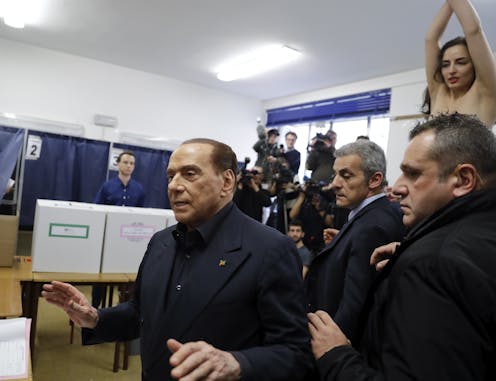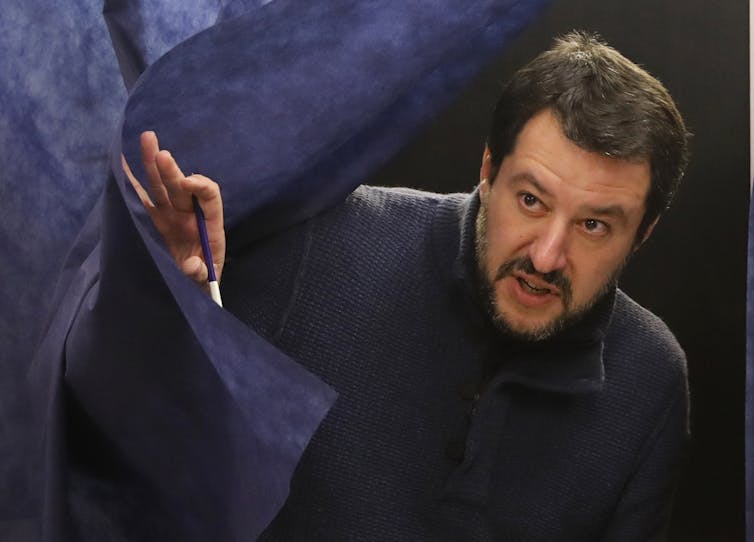In Italy, fake news helps populists and far-right triumph
Together, two parties with a tough stance on immigration and the EU – the Five Star Movement and the League – received nearly 50 percent of the vote.

Although there were no outright winners in Italy’s parliamentary election on March 4, there were two clear losers – the European Union and immigrants.
No one party or coalition won a majority and negotiations to form a new government are likely to last several weeks. But results have shown a dramatic increase in the number of votes for the populist Five Star Movement (Movimento Cinque Stelle) and far-right party the League (La Lega).
Five Star – which one commentator described as a party with a “rightist façade over a leftist basement and anarchic roof” – is poised to be the biggest party with more than 30 percent of the vote. The League, an anti-immigrant party in former Prime Minister Silvio Berlusconi’s coalition, soared to its best result ever with over 18 percent of the vote.
These results will alarm European observers given the anti-EU positions of both these groups. Nationalist French politician Marine Le Pen tweeted as the votes came in that it was a “bad night” for the EU.
I research how citizens in different countries use online tools, particularly search engines, to access election information. One thing is clear to me: The rise of these populist and far-right parties was supported by dramatic shifts in the information diet of Italian voters.
Cutting out traditional media
A study I co-authored shortly after the Italian election in 2013 showed that even then voters were keen on alternative online information sources. In particular, voters searching the internet for information about the Five Star Movement were more likely to look specifically for the party’s official website and online streaming channel instead of traditional media sites.
These trends, combined with Italians’ low levels of trust in media organizations, have made Italy fertile ground for spreading misinformation and propaganda online.
In the last five years, online alternative media platforms and their audience have grown exponentially in Italy. At the end of 2017, BuzzFeed exposed several popular Italian websites and Facebook pages that posed as news organizations but trafficked in misinformation with a focus on anti-immigration content. These outlets had several million social media followers. That is substantially more than Italian newspapers and political leaders who typically attract modest numbers of followers. For example, Italian Prime Minister Paolo Gentiloni has only 410,000 Twitter followers. Compare that to U.S. President Donald Trump with more than 48 million.
The appetite for this type of content increased as immigration became the central theme of the 2018 election campaign. In the lead up to the elections, Five Star’s leader Luigi Di Maio described organizations involved in migrant rescue operations as acting as “sea taxis,” implicitly accusing them of ferrying illegal migrants across the Mediterranean to generate more business for themselves. Meanwhile, the League’s leader Matteo Salvini campaigned on an “Italians First” platform reminiscent of Donald Trump’s “America First” mantra. In February, a neo-Nazi and former local candidate for the League went on a racially motivated shooting spree that wounded six African migrants.

The specter of Russian meddling
International experts and Italian government officials also pointed at Russian attempts to influence the Italian vote.
Last month, the Italian daily La Stampa identified several prolific Twitter accounts suspected as being used for Russian propaganda operations in Italy. In a report published last fall, the Atlantic Council, an American think tank, documented extensive links between Russian figures and both the Five Star Movement and the League.
Both these parties have pro-Russia policies. For example, their leaders have often spoken out against EU-sanctions on Russia. They have also expressed ambiguity towards NATO. Both candidates have received space on Kremlin-backed media such as the television network RT and news agency Sputnik. In addition, popular news websites controlled by the PR agency in charge of Five Star’s election campaign have posted content espousing Kremlin propaganda.
A broken media system
The problem is not simply that misinformation is readily available online, but also that a large proportion of Italians find this content credible.
In Italy, the line between politics and journalism is often blurred. Many journalists have made the transition to politicians and vice versa. Most recently, a top editor at La Repubblica - Italy’s most read newspaper - resigned to stand in the election as a Democratic Party candidate. The word “lottizzazione” – literally, “the division of land into plots” – is used to describe how control over various public TV and radio channels are divided by powerful political parties.
The commercial broadcasting sector isn’t much better. Ownership is concentrated in just a few hands, most notably those of former Prime Minister Silvio Berlusconi.
Berlusconi has for years sought to delegitimize the press outside of his media empire. He has called out journalists critical of his tenure as prime minister. Infamously, he mimed shooting a machine gun at a journalist during a press conference with Vladimir Putin in 2008.
Grillo has adopted similar rhetoric. He relentlessly attacks journalists as establishment crooks and encourages Five Star supporters to distrust Italian media.
Restoring trust in journalism
As Italian parties begin negotiations over who will be the next prime minister, these factors have created the conditions for online misinformation to continue to thrive. Both Facebook and the Italian police are experimenting with systems to eradicate bots and report purveyors of fake news. I believe these complex measures can help. However, long-term efforts to restore trust in journalism among Italian audiences are also essential.
This will involve strengthening media literacy skills, boosting the independence of the public broadcasting sector, and possibly reorganizing media ownership so that it is not as tightly concentrated. Without this ambitious set of measures, online misinformation and propaganda are unlikely to go out of fashion in Italy anytime soon.
Filippo Trevisan does not work for, consult, own shares in or receive funding from any company or organization that would benefit from this article, and has disclosed no relevant affiliations beyond their academic appointment.
Read These Next
Cuba’s speedboat shootout recalls long history of exile groups engaged in covert ops aimed at regime
From the 1960s onward, dissident Cubans in exile have sought to undermine the government in Havana −…
Drug company ads are easy to blame for misleading patients and raising costs, but research shows the
Officials and policymakers say direct-to-consumer drug advertising encourages patients to seek treatments…
Nanoparticles and artificial intelligence can help researchers detect pollutants in water, soil and
Tiny particles bounce light around in a unique way, a property that researchers are using to detect…




